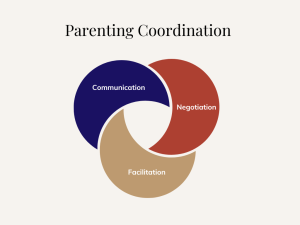

5
Aug
The Role of a Parent Coordinator: Facilitating Healthy Co-Parenting
Co-parenting after separation or divorce can be challenging, often fraught with conflict and misunderstandings. The well-being of the children involved can be compromised when parents struggle to communicate and cooperate effectively. A parent coordinator can play a pivotal role in easing these tensions, ensuring a healthier environment for the children. This blog will explore the role of a parent coordinator, the benefits they provide, and how they can help families navigate the complexities of co-parenting.
What is a Parent Coordinator?
A parent coordinator is a neutral third party, typically with expertise in psychology, social work, or law, who helps parents manage their co-parenting arrangements. They are trained to mediate disputes, facilitate communication, and create a structured plan for co-parenting that focuses on the best interests of the children. Their primary goal is to reduce conflict and improve the co-parenting relationship.
The Role of a Parent Coordinator
Parent coordinators perform several key functions, including:
- Mediation and Conflict Resolution: They help parents resolve disputes amicably without the need for court intervention. This can include disagreements over scheduling, education, healthcare, and extracurricular activities.
- Communication Facilitation: They assist parents in developing effective communication strategies, ensuring that interactions are constructive and child-focused.
- Parenting Plan Development: They help create and implement detailed parenting plans that outline the responsibilities and expectations for each parent, providing a clear framework for co-parenting.
- Monitoring Compliance: They ensure that both parents adhere to the agreed-upon parenting plan, addressing any issues of non-compliance swiftly to prevent escalation.
- Education and Guidance: They provide education on child development and the impact of parental conflict on children, helping parents understand the importance of cooperation and respectful communication.
Benefits of Using a Parent Coordinator
Engaging a parent coordinator can offer numerous advantages for both parents and children:
- Reduced Conflict: With a neutral party mediating disputes, the level of conflict between parents can be significantly reduced, creating a more stable environment for the children.
- Improved Communication: Parents learn to communicate more effectively, which can enhance their ability to co-parent and make joint decisions in the best interests of their children.
- Consistency for Children: A well-structured parenting plan provides consistency and predictability, which is crucial for the emotional and psychological well-being of children.
- Empowerment: Parents are empowered to resolve their disputes independently, reducing their reliance on the court system and fostering a sense of control and cooperation.
- Focus on the Child’s Best Interests: Parent coordinators keep the focus on the needs and well-being of the children, ensuring that parental decisions prioritize their health, safety, and happiness.
How to Find and Choose a Parent Coordinator
When considering a parent coordinator, it’s essential to choose someone with the right qualifications and experience. Here are some tips to help you find the right professional:
- Qualifications: Look for a parent coordinator with relevant credentials, such as a background in psychology, social work, or family law. They should also have specialized training in mediation and conflict resolution.
- Experience: Choose a coordinator with experience in dealing with high-conflict co-parenting situations and a proven track record of successful outcomes.
- References and Reviews: Seek recommendations from trusted sources, such as family lawyers, therapists, or other parents who have used their services. Online reviews can also provide valuable insights.
- Compatibility: It’s crucial that both parents feel comfortable with the coordinator. An initial consultation can help determine if the coordinator’s style and approach align with your needs and preferences.
- Cost: Discuss the fee structure and ensure it fits within your budget. Some coordinators may offer sliding scale fees based on income.
Conclusion
A parent coordinator can be an invaluable resource for families navigating the challenges of co-parenting post-divorce or separation. By facilitating communication, reducing conflict, and focusing on the best interests of the children, parent coordinators help create a more stable and nurturing environment. If you’re struggling with co-parenting conflicts, consider enlisting the help of a parent coordinator to foster a healthier and more cooperative co-parenting relationship.
To schedule a
consultation with an experienced family law attorney at Tom Bush Law Group,
please call us at 704-347-0110.




